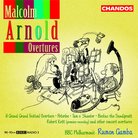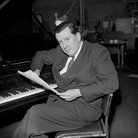Discovering Malcolm Arnold
Many years ago, at an international symposium on “Music in a Post-Modern World”, a famous French-Canadian musicologist dismissed the work of Malcolm Arnold as “insipid, lacking in lyrical inventiveness and indifferently scored”.
Jean Des Laubies-Badieux, an authority on British music, later received a tape from Malcolm Arnold with a message attached: “Would the enclosed change your view?”
“Not in the slightest!” cabled back the musicologist. But on hearing the piece again he changed his mind and sent Arnold a second cable: “Sounds better on a second hearing. What are you calling the piece?”
Arnold said: “Glad you like it. It’s got a title. Clarinet Sonata by Arnold Bax.”
It proved the start of a good friendship but Malcolm Arnold’s relationship with the British critics in the 1960s and 1970s was less relaxed. Pilloried by many because he refused to discard tonality in an age of fervid experimentation, he got into a battle of words with his persecutors.
“There is no justification,” he wrote in The Guardian in 1971, “for the arrogant way in which British music critics treat musicians…”
The critics, he declared, “did not have enough musical knowledge to give elementary music lessons”. It was a battle he would lose, and by the early 1980s he was languishing in a psychiatric hospital after a serious breakdown.
Malcolm Arnold’s music has always been able to speak for itself. But a knowledge of his life, often difficult and sometimes tragic, certainly gives it an important extra dimension. Malcolm has often acknowledged that his music and his life are one and, as we researched the biography, we were astonished to find to what a degree this is true.
The overture Beckus The Dandipratt is not simply about a cheeky little urchin he met on a wartime Cornish beach, but also his happiness as a 21-year-old in his marriage to Sheila and his recovery to health after his first big personal crisis.
The Sixth Symphony sums up his feelings after the move from the Surrey stockbroker belt to Padstow in the early 1960s. It is very much his “Cornish” Symphony.
The Second Clarinet Concerto expresses not just his friendship with Benny Goodman but what it felt to be in musical and tax exile in Monkstown, Dublin, in 1974.
The Philharmonic Concerto, written for the LPO’s tour of the States under Bernard Haitink, owes much to Malcolm’s sense of outrage when Isobel, his second wife, declared in 1976 that their separation was final.
Malcolm Arnold ceased writing in 1990 and was knighted in 1993. His gifts were sometimes akin to genius.








